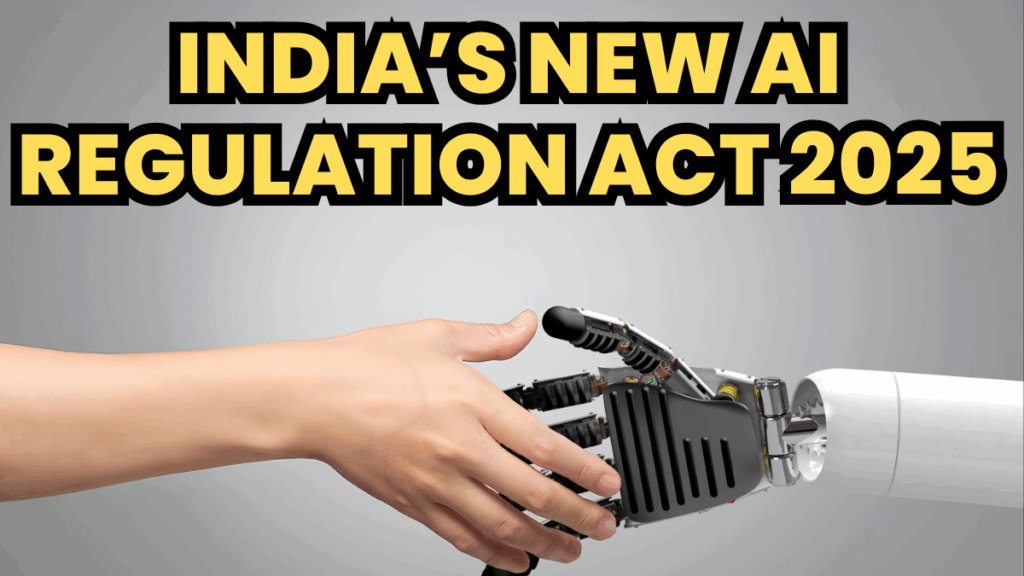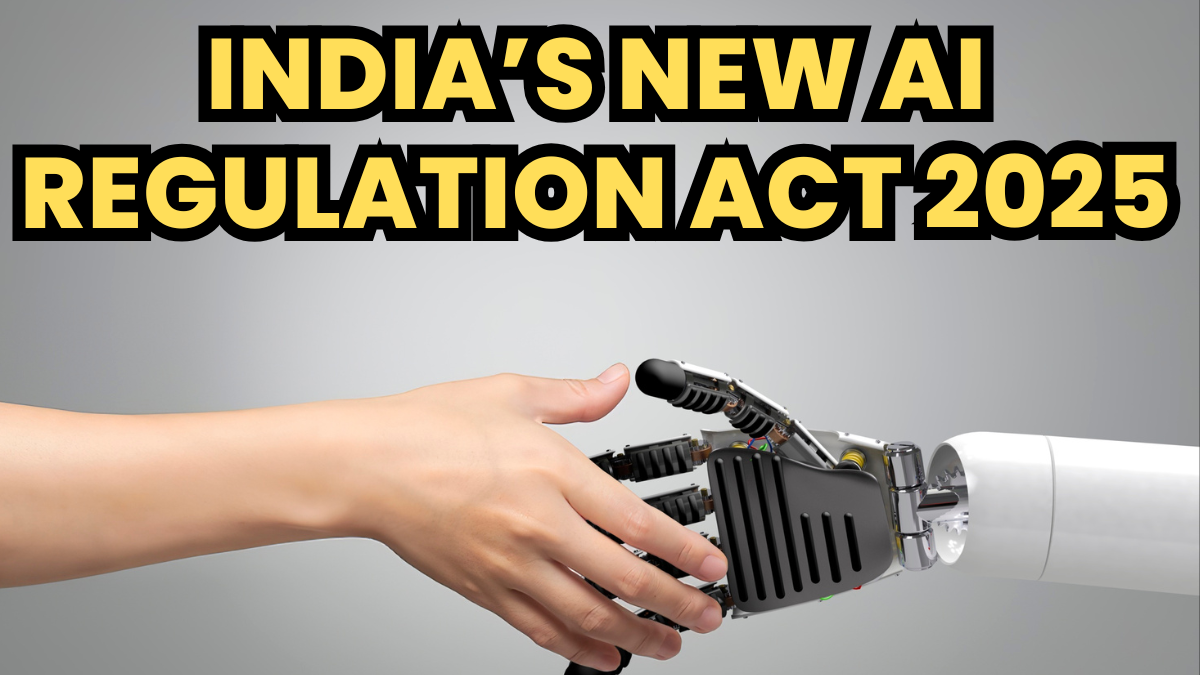In 2025, India officially passed the AI Regulation Act India 2025, a landmark law designed to govern the fast-growing artificial intelligence sector. With AI transforming industries from healthcare to finance, the Indian government recognized the urgent need for a legal framework for AI that ensures innovation while addressing risks related to ethics, privacy, and accountability.
This act is a major step in aligning India’s AI ecosystem with global standards, while also focusing on local priorities such as data protection, fairness, and responsible innovation. For tech companies, developers, and legal professionals, this law brings both new opportunities and compliance challenges.

Why India Needed an AI Regulation Act
AI adoption in India has accelerated at an unprecedented rate, with startups, enterprises, and government bodies all embracing automation and machine learning. But rapid growth also led to concerns:
-
Bias in AI Systems: Instances of AI tools showing gender or caste-based bias.
-
Data Privacy Risks: Unauthorized use of personal data in AI models.
-
Lack of Transparency: Many algorithms operate as “black boxes,” with no clarity on how decisions are made.
-
Legal Accountability: Difficulty assigning responsibility when AI makes errors.
By introducing the AI Regulation Act India 2025, the government seeks to strike a balance—encouraging innovation while protecting citizens from misuse.
Key Features of the AI Regulation Act 2025
The act introduces a structured legal framework for AI with several important provisions:
-
AI Classification System
AI applications are categorized as:
-
Low-Risk: Chatbots, recommendation systems.
-
Medium-Risk: HR recruitment AI, financial scoring.
-
High-Risk: Healthcare diagnostics, autonomous vehicles, law enforcement tools.
Stricter rules apply to high-risk AI systems.
-
Mandatory Transparency
Developers must provide clear documentation explaining how AI models work, including data sources and decision-making logic. -
Bias and Fairness Audits
AI systems must undergo periodic audits to check for discriminatory patterns. -
Data Protection Compliance
The act aligns with India’s Digital Data Protection Bill, ensuring that AI companies use personal data responsibly. -
Liability Framework
If an AI system causes harm, the act establishes clear rules for accountability among developers, deployers, and users. -
AI Ethics Committee
A national regulatory body has been created to oversee compliance and provide guidance to startups and enterprises.
Impact on Tech Companies and Startups
For Indian startups and tech companies, the AI Regulation Act India 2025 introduces both challenges and opportunities:
-
Compliance Costs: Companies must invest in audits, legal support, and transparency reports.
-
Market Advantage: Compliant companies gain consumer trust and easier access to global markets.
-
Innovation Push: The act encourages development of fair, ethical, and explainable AI tools.
-
Global Collaboration: Aligning with international standards allows Indian firms to export AI solutions more easily.
Many startups are already partnering with law firms and consultants to understand compliance requirements.
Implications for the Legal Sector
The act also impacts lawyers and legal professionals in India:
-
New Practice Area: Legal experts specializing in AI compliance are in high demand.
-
Contractual Changes: AI-related clauses are being added to corporate agreements and vendor contracts.
-
Litigation Opportunities: Disputes over AI bias, data misuse, and liability will increase.
-
Judicial Training: Courts may need to rely on expert witnesses and AI explainability reports.
This ensures that the legal sector grows alongside technology, adapting to new challenges in governance.
Public and Ethical Perspectives
The AI Regulation Act India 2025 has sparked debates across the country:
-
Supporters argue it ensures fairness, prevents exploitation, and enhances trust in AI.
-
Critics fear over-regulation could slow down innovation and burden small startups.
-
Civil Rights Groups welcome stronger data privacy measures but want stricter penalties for violations.
The government is emphasizing flexibility by promising regular updates to the act as AI technology evolves.
The Road Ahead
India’s new legal framework for AI positions the country as a responsible leader in emerging technologies. Future amendments may include:
-
AI-specific intellectual property laws.
-
Stronger penalties for misuse of facial recognition.
-
Incentives for ethical AI research.
-
Cross-border agreements on AI trade and data sharing.
By 2030, India is expected to be one of the largest AI hubs in the world, and this regulation ensures sustainable growth.
Final Thoughts
The AI Regulation Act India 2025 is a landmark law that provides clarity, accountability, and ethical direction for the AI industry. While compliance may initially seem demanding, it will strengthen India’s position in the global AI economy. For developers, companies, and lawyers, this act is not just about restrictions but also about building trust and driving innovation responsibly.
FAQs
What is the AI Regulation Act India 2025?
It is a new law that governs how AI is developed and used in India, focusing on ethics, transparency, and accountability.
Who does the act apply to?
It applies to developers, companies, and users deploying AI systems in India, with stricter rules for high-risk applications.
Will this act affect Indian startups?
Yes, startups must comply with audits and transparency requirements, but it also helps them gain trust and global recognition.
What role does the AI Ethics Committee play?
It oversees compliance, issues guidelines, and resolves disputes related to AI use in India.
Click here to know more.
